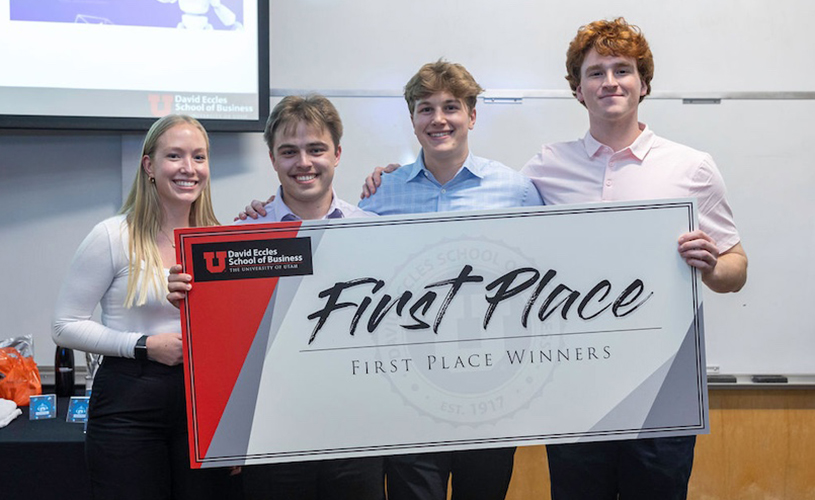at the University of Utah
Pixels to Possibilities: Inside the Generative AI Hackathon
In the fast-paced world of technology and business, innovation isn’t just a buzzword — it’s a way of life. On March 23, 2024, the Information Systems department at the David Eccles School of Business hosted an event that epitomized this spirit of innovation: the Generative AI (ChatGPT) Hackathon.
As the world witnessed an unprecedented surge in the adoption of ChatGPT, with over 100 million active users embracing its capabilities within two months since its launch, businesses scrambled to harness its potential for competitive advantage. The hackathon presented an unparalleled opportunity for students to leverage this groundbreaking technology to solve real-world business problems and create tangible value for client companies.
One of the most remarkable aspects of ChatGPT is its ability to accelerate idea iteration and solution creation. No longer bound by the constraints of traditional methods, students were enabled to explore complex ideas and develop innovative solutions in significantly less time than before.
The Hackathon invited participants from various backgrounds — whether they were experts in machine learning or programming or curious newcomers to the field — providing an inclusive environment for collaboration and learning.
Comprising 20 teams of three or four students each from undergraduate and graduate programs, participants embarked on a journey to analyze business problems, design cutting-edge solutions, and present their findings to a discerning panel of judges. To ensure diverse perspectives within each team, it was mandatory that one member be enrolled in either Information Systems undergraduate major, MSIS or MSBA programs, QAMO IS Emphasis, or IS Minor.
Throughout the competition, teams were evaluated on criteria encompassing the quality of their solutions, the professionalism of their materials, the effectiveness of their presentations, and the novelty of their approaches. Judges were on the lookout for solutions that not only demonstrated the potential to generate high-quality business value but also showcased creativity, innovation, and a deep understanding of the problem at hand.
As the Hackathon wrapped up, the excitement in the air was palpable as teams prepared to present their solutions and vie for top honors. Each presentation was a testament to the grit and dedication of the participants, showcasing an assortment of strategies and insights that left a lasting impression on judges and spectators alike.
Even though only a few could claim victory, every participant gained invaluable skills, experiences and connections that will be beneficial in their future endeavors. From sharpening their problem-solving abilities to mastering the art of effective communication, the Generative AI (ChatGPT) Hackathon was more than just a competition, it was a transformative learning experience that will shape the trajectory of participants’ careers for years to come.
As we look ahead to the future, one thing is certain: the possibilities unleashed by generative AI are limitless, and with events like the Generative AI (ChatGPT) Hackathon leading the way, the next generation of innovators is poised to revolutionize the business landscape in ways we can only imagine.
“I’m excited to recount my journey at the Generative AI Hackathon held at the David Eccles School of Business, University of Utah. My interest in AI existed even before the current popularity, so participating in this event was truly exhilarating. Hats off to Matthew Pecsok for bringing this transformative competition to our attention, highlighting how AI is reshaping the way we work, inspiring creativity, and streamlining processes. Our task involved analyzing 984 patient reviews of unstructured data using AI technology. With the assistance of Google Vertex AI, and a smooth pivot to OpenAI’s Assistant API, we delved into the data, employing Tableau and Looker to bring our findings to life. Working with my team to navigate through tools like ChatGPT-4 and VertexAI was an unforgettable experience. We delved into various visualizations including time-series, pie charts, bar charts, and conducted sentiment analysis and clustering to make sense of this unstructured data. Competitions like this will allow exposure to students to use AI as a friend and get right results with proper prompts.”
– Sai Eshwar Tadepalli
Congratulations to all who participated in our 2024 Generative AI (ChatGPT) Hackathon!
Winners:
First Place
AI Amigos
- Jeb Dean
- Jake Kreis
- Avery Losee
- Harrison Newman
Second Place
LinkedIn Legends
- Grant Bird
- Josh Cardwell
- Caleb Speirs
Third Place
Team_1
- Emilee Bogan
- Yuyang Chen
- Israel Chino
- Amit Kumar Sahu





